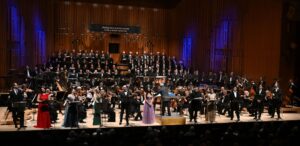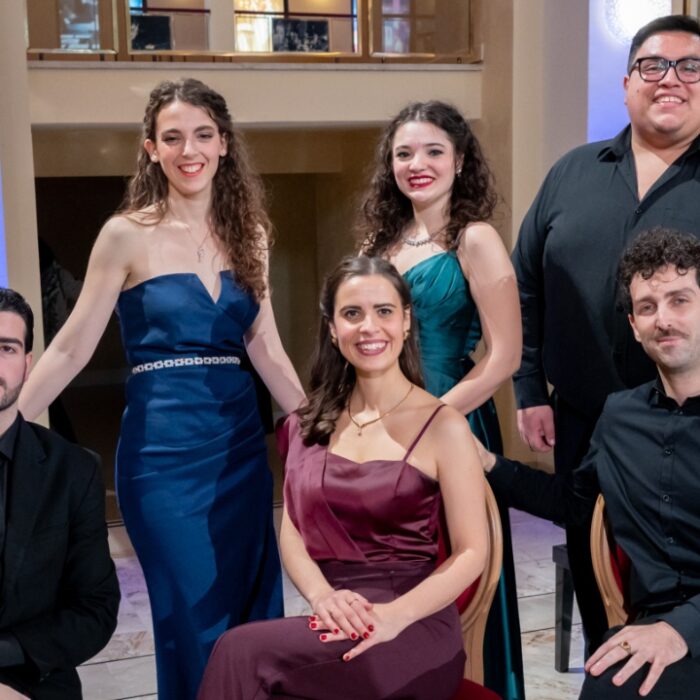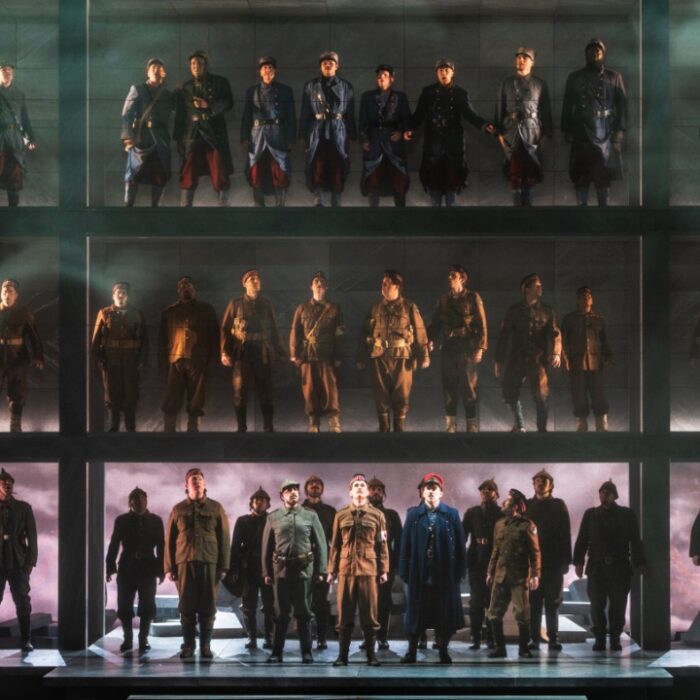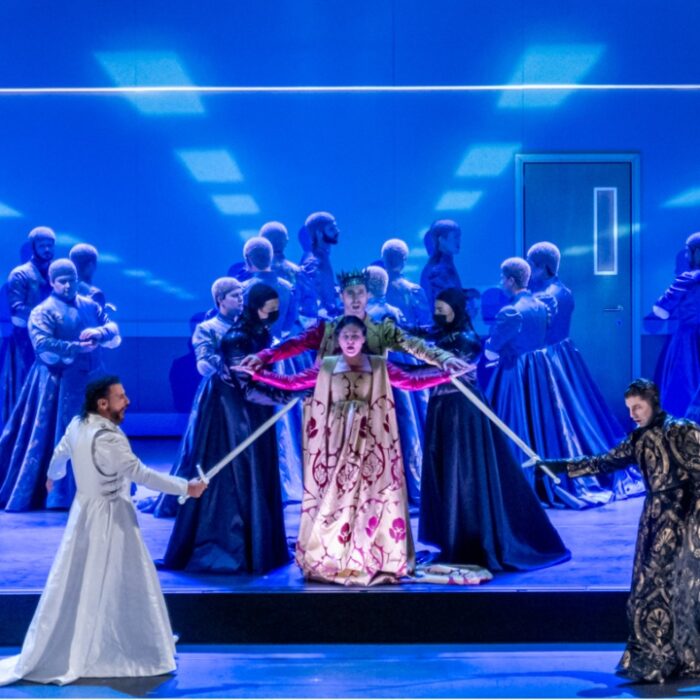
London Symphony Orchestra 2024-25 Review: La Rondine
Maestro Sir Antonio Pappano & Stellar Vocal Performances Produce a Euphonious Delight
By Mike Hardy(Photo: Mark Allan)
Puccini called his work “La Rondine” a “commedia lirica,” effectively COMIC opera, but I consider it a TRAGEDY that this work isn’t performed more in the opera house.
“La Rondine” comprises some of the most exquisite, emotive music the maestro ever penned. Alas, devoid of the dramatic impact and impetus of his more famous, regularly performed works, it is scarcely deemed worthy of staging by impresarios, given its lightweight theme: a doomed romance with no histrionic turn of events or tragic deaths.
Maestro Sir Antonio Pappano gave no thoughts to such trivial matters as he took to the podium at the Barbican in London however, where he commanded the London Symphony Orchestra (LSO) and a cast of singers in a concert version of the work.
Mainly obscured, as he invariably was in the opera house pit, it was a joy to see him, literally, under the spotlight and in full view. It is indeed a sight to behold, watching him at work, an elite marionettist pulling ALL the strings of his players, gesturing here, pointing there, driving his charges, dancing, gesticulating, prancing, at times so animated that I feared he would lose his footing and fall from his small, confined podium. That he is a musical genius is inarguable. The passion for what he does emanates from his very being, an almost tangible aura surrounding his enthusiastic, vibrant form.
The LSO itself, led by Pappano since September of this year, were quite majestic; again, the experience enhanced somewhat by virtue of being on full view, turning out Puccini’s score with exquisite care and attention.
Whether or not the lack of any requirement to concentrate on staging positions or real direction served to enhance or focus the singing performance of the artists, I can not say, except to state that this proved to be a euphonious delight, vocally.
Spectacular Singing
Nadine Sierra was penned in to perform the role of Magda, but she is in recovery from a medical procedure. Instead, Bolivian-Albanian soprano Carolina López Moreno performed the role of Magda and positively shone here as the Parisian courtesan. She may have been a stand-in, but she had no need to refer to the score, singing with glorious aplomb. She possesses a shimmering tone, often voluminous, with a radiant, top. She delivered an exquisite “Ore dolci e divine” and her signature aria “Chi il Bel Sogno di Doretta?” was sublime, receiving much deserved applause.
Her chief admirer, Ruggero, was performed by the renowned American tenor Michael Fabiano who cut a rather studious, serious first impression with his bespectacled form. Vocally, seemingly hesitant in the early stages with his “Parigi! È la città dei desideri,” he soon blossomed to produce a fine and very sweet accompaniment in “Nella dolce carezza della danza” before producing a most sudden, unexpected and ardently pressed kiss that appeared to even take Carolina by surprise!
His powerful line and silvery top came into further prominence in the “Bevo al tuo fresco sorriso” quartet where his piercing tone cut through both the orchestration and eager chorus. He impressed throughout the evening, delivering a contemplative “Dimmi che vuoi seguirmi” which managed to avoid the usual, overly saccharine sentimentality. His “Ma come puoi lasciarmi se mi struggo in pianto” where he begs Magda not to leave him was genuinely moving and, for me, was one of the key highlights of the evening.
By contrast, the other lovebirds in the equation, supercilious poet Prunier and his secret on/off lover Lisette, maid to Magda, performed by American tenor Paul Appleby and Italian soprano Serena Gamberoni respectively, ham it up for laughs. Appleby has a fine, shiny bright tenor instrument with which he impresses throughout the whole first act. In fact, until Ruggero makes his entrance later in Act one, he holds the pivotal role as the lead tenor. He sets the stage and to a degree, the characters on it. His “Forse, come la rondine” was especially warm and enchanting, but his triumphs lay in his melodramatic yet witty retorts, along with the comedic squabbles with his girlfriend Lisette.
Gamberoni has a strong, expressive soprano and combined with her jocoseness, probably epitomized to perfection what Puccini meant by “commedia lirica”. Whether entering or exiting the stage, she did so with comical gusto.
More Performance Highlights
British baritone Ashley Riches takes on the role of Rambaldo, Magda’s wealthy ‘protector’. Cutting a very tall figure, he is suitably austere and constraining and sings his lines with rich, dark resonance.
Sarah Dufresne, Angela Schisano and Marvic Monreal are the essential party girls who give the whole show the requisite, essential sparkle, beauties for the eyes as well as the ears. I have frequently pondered why; after having seen her excel on a number of occasions now, Canadian soprano and former Jette Parker Alumna Sarah Dufresne has not been contracted to perform more substantial roles in the house. She has a voice of pure crystal, exquisitely polished, clarion and attention grabbing and I am always left wishing I could hear more of her.
The London Symphony Orchestra chorus made invaluable contributions here, not just with their delightfully engaging swaying during certain passages, but especially during the final passages of the “Bevo al tuo fresco sorriso” where the sheer wall of sound produced, quite literally, took one’s breath away. Possibly not surprising, given that their numbers were close to NINETY strong!
Whoever labelled “La Rondine” a “poor man’s ‘Traviata’” never lived, and certainly never loved. For what makes this underplayed mini-masterpiece so special is, frustratingly, the very reasons it is seldom staged. It is devoid of all the overly-melodramatic, theatrical murders, suicides and completely improbable tales of woe that are the hallmarks of most operas. Yet in its uncomplicated, simple story of near-tangible heartbreak, it is all the more potent for it. It is genuine. Real. TRUE verismo.
It’s NOT a “poor man’s Traviata.” It’s pure, unbridled richness for everyone.
Categories
Reviews


